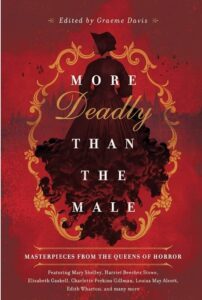More Deadly Than the Male: Masterpieces from the Queens of Horror edited by Graeme Davis
Pegasus Books Ltd., 2019
ISBN-13: 9781643130118
Available: Hardcover, Kindle, audiobook, audio CD
Buy: Amazon.com
More Deadly Than the Male gives us 26 tales of terror written by women between 1830-1908. Some of my favorite Gothic and horror tales were written around this time period. Davis has selected some great stories in this anthology by well-known, and some not as well-known, women authors. In addition to select stories, Davis includes brief biographies with information about the authors’ lives and challenges they faced as women writers, and about the stories themselves. While I enjoyed all of the stories in More Deadly Than the Male, there are several that stand out. Some of my favorite tales include the following.
The volume opens with Mary Shelley’s “The Transformation,” in which Guido, seeking revenge, makes a deal with a monstrous being to trade bodies. What will become of the man trapped in a monster’s body?
In “Lost in a Pyramid, or the Mummy’s Curse” by Louisa May Alcott, Evelyn begs Forsyth to tell her how he came to be in possession of an ancient and strange gold box. He tells a tale of exploration, colonization, greed, hubris, and the mummy of an ancient sorceress and mysterious seeds found in the box.
Edith Nesbit’s “The Mass for the Dead” is a haunting story about a couple who change their history because of a vision. Jasper mourns that the woman he loves, Kate, is to marry someone else. When she reveals she is not marrying for love, but for wealth, he still insists that she should break her engagement. Out of familial obligation, she refuses to end the engagement in order to help her father with his finances. When she shares her vision of a mass for the dead with Jasper, they believe it to be a sign of her impending marriage. Later, when he reveals his own vision to Kate, they find they may have misinterpreted the vision entirely.
“The Vacant Lot” by Mary E. Wilkins-Freeman is a lovely ghost story. The Townsend family has decided to move to Boston, and the man of the house has purchased a home for a more than reasonable cost, originally $25,000 for a mere $5,000. The family wonders what the catch is with such a low dollar amount. After a month goes by, they find out. There are strange happenings in the vacant lot next door, and shadows moving about with nobody to cast them.
Other authors include Charlotte Perkins Gilman, Mary Austen, Elizabeth Gaskell, Edith Wharton, Eliza Lynn Linton, Margaret Oliphant, Vernon Lee, Mary Louisa Molesworth, Ada Travenion, Edith Wharton, and more.
It’s not new or controversial to say that horror is subjective. When we read the Gothic or older horror tales of the past, we may not be frightened, we may not get the spine tingles we are looking for or may scoff at the fainting or other what we would deem as “quaint behaviors” of the heroines. Descriptions tend to be much longer and go too far for modern audiences. I, for one, love Gothic and older horror stories, thanks to my late grandmother Phyllis, so these early stories were great to read. I just recently heard about a subgenre called “cozy horror,” and I believe these would qualify. Also, not only would this be a good addition to a Gothic fiction collection, but it would also be an interesting addition to a Gothic novels course.
Highly recommended
Reviewed by Lizzy Walker





Follow Us!